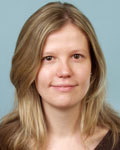Energy Seminar: Protic ionic liquids: effect of environment on the extent of proton transfer and CO2 capture

Dr. Ekaterina (Katya) Pas
Please join Dr. Ekaterina (Katya) Pas, Tuesday, August 25th, from 3:30 - 4:30 in DeBartolo Hall, Room 141.
Abstract:
Protic ionic liquids (PILs) belong to a special class of ionic liquids obtained by proton transfer from a Brønsted acid to a Brønsted base.1 The thermodynamic criterion for the prediction of the extent of proton transfer (PT) is linked to the difference in aqueous pKa values of the base (B) and the acid (AH):
∆G ≈ -∆pKa(aq) = -[pKa(aq)(B) - pKa(aq)(AH)]
In the pharmaceutical world it was shown that in crystalline salts ∆pKa of > 3 is sufficient to ensure the proton transfer.2 On the other hand, Yoshizawa and Angell reported that the ∆pKa should be at least 10 to ensure the completeness of the proton transfer process in PILs.3 Recently we have shown that for PILs the use of aqueous pKa values is not a reliable criterion to judge the extent of PT.4 In addition, the ability of ionic liquid ions to form extended hydrogen bonding has been proven to play a vital role in driving the proton transfer. In this talk I will show how the extent of proton transfer changes depending on the hydrogen bonding ability of amines when combined with weak and strong acids to form PILs.5 I will discuss computational strategies for the prediction of the extent of PT in the mixtures of primary, secondary and tertiary amines with acetic, difluoroacetic and trifluoroacetic acids. In order to confirm the established strategy, the extent of proton transfer was probed through a series of experimental results including a Walden plot and temperature-dependent FT-IR spectroscopy. In this talk I will also show how the dynamic equilibrium between neutral and ionic species in PILs can help improve the CO2 capture in amine-functionalised ionic liquids.
Biography:
Dr. Ekaterina (Katya) Pas graduated from The Higher Chemistry College (affiliated to the Russian Academy of Science) in 2000 with a Bachelors and Masters degree in chemistry, both with honours. In 2004 Dr. Pas obtained her Ph.D. under supervision of Prof. S. Grimme from the University of Muenster, in the field of Theoretical Chemistry. Her group specialises in the development and applications of computational chemistry methods for the prediction of chemical and physical properties of ionic materials and their mixtures with molecular solvents such as water and acetonitrile, molecular gasses such as CO2 and SO2, redox couples for fuel and solar cells and metal ions used in metal-ion batteries. Her recent development of the modified MP2 method in combination with the Fragment Molecular Orbital (FMO) approach opens up a great opportunity to accurately predict energetics of large-scale clusters of ionic materials. In the School of Chemistry, Katya also contributes to the teaching program through a core unit on Advanced Physical Chemistry (with the Computational Chemistry component) and an Honours module on Computational Chemistry.
This seminar is hosted by the Department of Chemical and Biomolecular Engineering.
Please see the Dr. Ekaterina Pas Seminar Flyer for more information.